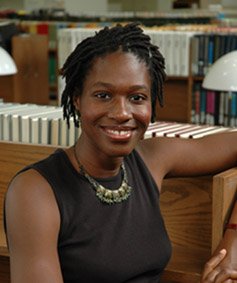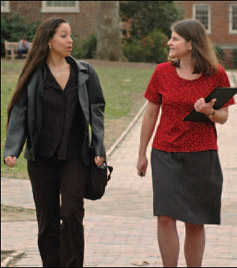

A publication of The Graduate School, University of North Carolina at Chapel Hill
On-Line Version Spring 2006
Home | Back issues | About us | The Graduate School | UNC-Chapel Hill | Make a gift
Shared
Experiences, Common Ground
 |
| Photo by Will Owens |
|
Anthropology professor Arturo Escobar serves as an informal mentor to international students, who benefit from having a mentor who is also from abroad. Escobar is from Colombia. |
When Courtney Lewis was deciding where to pursue her doctorate in anthropology, finding a suitable mentor was one of her top priorities. First and foremost, she wanted someone with whom she felt comfortable and who had a broad base of knowledge about economic systems among American Indian tribes.
Lewis, who is supported by both the David and Gladys McNelis Scholars for Tomorrow Fellowship and Graduate School Doctoral Merit Assistantship, was thrilled when she discovered that assistant professor Valerie Lambert not only had these attributes, but also shared her background as a Native American from one of the five tribes of Oklahoma.
“It was pretty amazing to find all of that in one package,” said Lewis, a member of the Cherokee Nation. “Being a member of such a small minority, it’s very difficult to find someone from that background who has all the things you want in a mentor. When I found out we had that shared background, it really clicked.”
Lambert, who has a Native American mentor herself, said minority mentors are often able to recognize the unique challenges of being a minority in the academic world.
“One thing that minority mentors offer to minority students is that they can identify certain difficulties that minority students experience that people of the majority culture might not be able to recognize,” explained Lambert, a member of the Choctaw Nation of Oklahoma. “As a mentor, you need to be able to anticipate problems and guide the student in a way that is very proactive. If you have a shared set of experiences and history, then you’re better able to do that.”
Because there are relatively few minority professors in many departments, some students must reach beyond their specific fields to establish such relationships. Whitney Robinson, an epidemiology doctoral student and Caroline H. and Thomas S. Royster Jr. Fellow, works most closely with white professors but has formed informal relationships with professors who share her African- American heritage.
 |
| Whitney Robinson (above) turns to African-American professors in health fields for inspiration. |
 |
| Courtney Lewis (below, left) and Valerie Lambert bond over their American Indian heritage. |
| Photos by Will Owens |
“They’re not working on the same thing as I am, but I know them as minority faculty and I have worked to build bridges,” she said. “Just talking to them in general and hearing about their life stories gives me emotional sustenance.”
To Robinson, these minority faculty members — particularly those from earlier generations — are an inspiration because of the many obstacles they have had to overcome.
“I really admire the fact that they’ve been pioneers in their own right and worked in a system that was not always so welcoming to them," she said.
Arturo Escobar, director of the Institute of Latin American Studies, says international students as well as minority students can derive benefits from working with mentors who share their backgrounds.
“It’s a kind of a shared experience that we have as people who grew up in a different country and moved to the United States for school,” said Escobar, who grew up in Colombia. “It’s something I understand very well and that faculty who haven’t been exposed to those types of issues might not consider a priority for them.”
Escobar has established mentoring relationships with several international students, including anthropology doctoral student Euyryung Jun, who is a native of South Korea. Jun said the relationship helped her feel less overwhelmed when she first arrived in the United States.
“Foreign-born faculty have gone through the same experience that I am having as an international student when they were graduate students themselves in America,” she said. “They can see issues that I may have as an international student that faculty raised in America are not as sensitive to.”
In addition to the special understanding that minority and international mentors provide, Escobar believes students benefit from having role models from similar backgrounds who have been successful in the academic world.
“The minority student can see in the minority faculty member someone who has already accomplished what the student wants to accomplish,” he said. “This student sees a person who has become an important and respected person, a leader in the university in different ways.”
Having such role models, says Escobar, might help combat the problem of the glass ceiling, a phenomenon in both the corporate and academic worlds in which women and minorities are relatively well represented in the lower ranks but poorly represented in leadership positions.
“This goes back to the idea that mentoring is a mechanism that can be used to address those situations,” he said. “We have made progress, but there’s still much work to do.”
- Erik Holmes
© 2006, The Graduate School, The University of
North Carolina at Chapel Hill
All text and images are property of The Graduate School
at the University of North Carolina-Chapel Hill. Contact Sandra Hoeflich
at shoeflic@email.unc.edu
to request permission for reproduction.